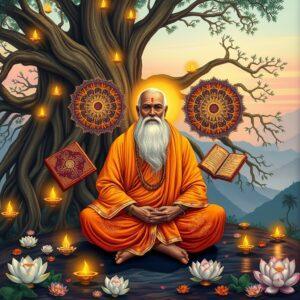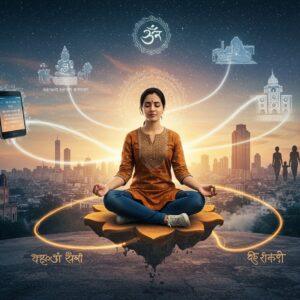
India boasts a rich philosophical tapestry woven over millennia. These philosophical systems, known as the Shad Darshanas (six viewpoints), offer profound insights into life, existence, and the universe. They are broadly categorized as orthodox (Astika), accepting the authority of the Vedas, and heterodox (Nastika), which do not.
Astika and Nastika: A Key Distinction
The Vedas, ancient scriptures, hold immense cultural and historical significance in Indian philosophy. The classification of philosophical schools as Astika or Nastika hinges on their acceptance or rejection of these texts. This fundamental difference shapes their teachings and interpretations of reality.
- Astika schools, embracing Vedic authority, include Nyaya, Vaisheshika, Samkhya, Yoga, Purva Mimamsa, and Vedanta.
- Nastika schools, those that reject the Vedas, include Charvaka, Ajnana, Buddhism, and Jainism. Charvaka stands out for its materialistic and atheistic perspective, while Ajnana is known for its radical skepticism, posing a challenge to early Buddhist and Jain thought.
The Six Orthodox (Astika) Schools
1. Nyaya: The School of Logic
Nyaya emphasizes logic and epistemology, providing a framework for clear thinking and reasoned argumentation. It identifies four valid means of acquiring knowledge: perception, inference, comparison, and testimony. The Nyaya Sutras, a collection of aphorisms, serve as a cornerstone of Indian logic. Nyaya’s focus on rigorous reasoning makes it a vital tool for philosophical inquiry.
2. Vaisheshika: Exploring the Physical World
Vaisheshika delves into metaphysics and atomism, seeking to understand the fundamental constituents of reality. It categorizes reality into six Padarthas (categories), with key concepts like Dravya (substance) and Paramanu (atoms). The Vaisheshika Sutras provide a detailed analysis of these categories, contributing significantly to Indian metaphysical thought. Vaisheshika’s systematic approach to understanding the physical world complements Nyaya’s focus on logic.
3. Samkhya: Duality and Liberation
Samkhya, a dualistic school, distinguishes between Purusha (consciousness) and Prakriti (matter). It posits that liberation (Moksha) is achieved through the realization of this distinction. The three Gunas—Sattva (purity), Rajas (activity), and Tamas (inertia)—play a crucial role in this philosophy. Understanding the interplay of Purusha, Prakriti, and the Gunas is central to Samkhya’s path to liberation.
4. Yoga: The Path to Self-Realization
Yoga, a practical and spiritual philosophy, outlines the path to self-realization through physical and mental disciplines. The Yoga Sutras of Patanjali provide a comprehensive guide to the Eightfold Path (Ashtanga Yoga). This path encompasses ethical precepts (Yama), self-purification practices (Niyama), physical postures (Asana), breath control (Pranayama), sense withdrawal (Pratyahara), concentration (Dharana), meditation (Dhyana), and absorption (Samadhi). Yoga’s emphasis on practice makes it a transformative force for individuals seeking inner peace and spiritual growth.
5. Purva Mimamsa: Ritualism and Dharma
Purva Mimamsa focuses on the correct interpretation of the Vedas, particularly concerning rituals and Dharma (duty). It emphasizes the importance of performing rituals correctly to achieve specific results. The Purva Mimamsa Sutras provide detailed guidelines for understanding and performing Vedic rituals. Mimamsa’s emphasis on Dharma provides a framework for ethical and righteous living within the Vedic tradition.
6. Vedanta: Exploring Ultimate Reality
Vedanta delves into the nature of ultimate reality (Brahman) and its relationship with the individual self (Atman). It has several sub-schools, including Advaita (non-dualism), Vishishtadvaita (qualified non-dualism), and Dvaita (dualism). Key texts for Vedanta include the Upanishads, Brahma Sutras, and Bhagavad Gita. Vedanta’s exploration of Brahman and Atman offers profound insights into the nature of existence and the path to liberation.
The Heterodox (Nastika) Schools
1. Buddhism: The Path to Enlightenment
Buddhism, founded by Siddhartha Gautama (the Buddha), focuses on ending suffering and achieving enlightenment. The Four Noble Truths explain the nature of suffering, its cause, its cessation, and the path to its cessation. The Eightfold Path provides a practical framework for ethical conduct, mental discipline, and wisdom. Buddhism’s emphasis on mindfulness and meditation offers a path to inner peace and liberation from suffering.
2. Jainism: Non-Violence and Liberation
Jainism emphasizes non-violence (Ahimsa), non-possession (Aparigraha), and the multifaceted nature of truth (Anekantavada). It focuses on the liberation of the soul (Jiva) from the cycle of rebirth. Asceticism and ethical conduct are central to Jain practice. Jainism’s emphasis on non-violence extends to all living beings, promoting a philosophy of compassion and respect for life.
3. Charvaka: Materialism and Skepticism
Charvaka, a materialistic and skeptical school, rejects the authority of the Vedas and emphasizes direct perception as the only valid source of knowledge. It denies the existence of an afterlife and the efficacy of rituals. Charvaka’s focus on the present moment and sensory experience distinguishes it from other Indian philosophical schools.
Poojn.in: Supporting Your Spiritual Journey
Poojn.in, India’s largest cultural goods and services store, offers a wide range of products to support your exploration of Indian philosophy. Whether you’re seeking sacred texts, meditation cushions, puja items, or traditional clothing, poojn.in provides a convenient and reliable platform to acquire authentic items for your spiritual practice. Discover a diverse collection of products carefully curated to enhance your understanding and engagement with these rich philosophical traditions. Find products related to the philosophies mentioned above, including:
- Bel malas for your japa meditation practice.
- Tulsi malas for connecting with the divine.
- Meditation asanas for comfortable and focused practice.
- Brass diyas to illuminate your space and create a sacred ambiance.
Explore poojn.in today and discover a world of spiritual treasures.
Further explore the depths of Indian philosophy with these related blog posts:
- Connecting With Your Inner Self: A Hindu Philosophy Guide
- Hindu Philosophy Explained: A Beginner’s Guide
- Beyond the Temple: India’s Spiritual Heart Revealed


